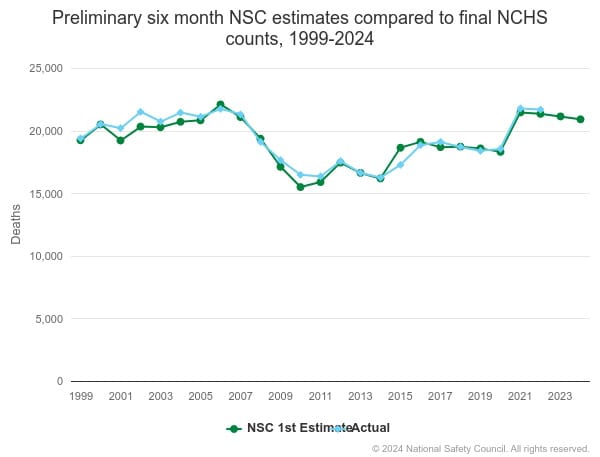
“While it’s encouraging that traffic fatalities have not increased in the first half of 2024, the fact that they remain unchanged highlights the urgent need for continued action,” said Mark Chung, executive vice president of safety leadership and advocacy at NSC. “Doubling down on our collective efforts to implement the Safe System Approach and deploying lifesaving technologies without delay can make all the difference. Lives depend on the creation of a safe transportation system for all, and there’s more to be done to ensure every journey ends safely.”
According to survey findings NSC released this past May, the Safe System Approach, which takes a holistic look at road safety to eliminate fatal motor vehicle crashes, is widely supported. The survey further revealed adults in the U.S. are concerned for their safety and the safety of family and friends on the roads. As the country looks ahead to the rest of the year, America’s leading nonprofit safety advocate implores employers, policymakers, community leaders and individuals to come together to prioritize the five elements of the Safe System Approach: safer roads, safer speeds, safer vehicles, safer people and better post-crash care.The Safe System Approach will save lives and move the United States closer towards zero traffic fatalities.
NSC applauds the recently announced Lives with Connectivity: A Plan to Accelerate V2X Deployment roadmap by the U.S. Department of Transportation, which lays the groundwork to invite federal and state partners, private industry and safety advocates together to harness the power of wireless technology to save lives on U.S. roadways. The Council also looks forward to the National Highway Traffic Safety Administration completing its review of the Advanced Notice of Proposed Rulemaking for the implementation of Advanced Impaired Driving Prevention Technology in new vehicles. Technologies like these should be the new default and deployed nationwide without delay to save lives.
NSC estimates are subject to slight increases and decreases as the data mature. NSC collects fatality data every month from all 50 states and the District of Columbia and uses data from the National Center for Health Statistics, so that deaths occurring within one year of the crash and on both public and private roadways—such as parking lots and driveways—are included in the estimates.